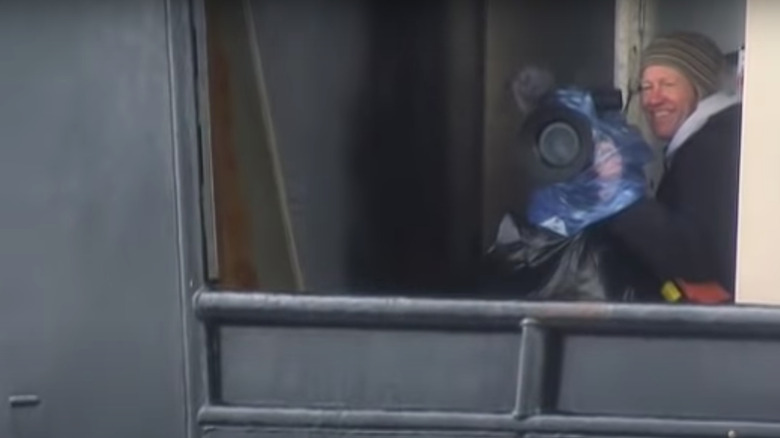One Way The Cameras Take A Physical Toll On The Deadliest Catch Crews
Since the earliest days of the travelogue genre at the beginning of the 20th century, filmmakers have been traveling to the Arctic reaches of North America to capture remote, punishing scenery. Reality television crews carry on that tradition today, crafting illuminating programs like "Ice Road Truckers" and "Alaskan Bush People." Of these series, perhaps none has been on the air longer — or amassed a more devoted following — than "Deadliest Catch."
A linchpin of Discovery since its premiere in 2005, "Deadliest Catch" follows the crews of several Bering Sea fishing vessels as they brave gale-force winds, bitter cold, and hazardous decks strewn with debris, all in the name of the world's most coveted seafood. Though "Deadliest Catch" captures the lives of captains, engineers, and deckhands, no footage would be captured without the series' intrepid camera crew, who similarly risk life and limb to get the perfect shot. The relationship between the camera operators and the mariners, however, isn't always harmonious.
Demanding a quiet set can spell trouble for sleep deprived deckhands
For the seafaring camera operators on "Deadliest Catch," their job is a balancing act: effectively capture life on a fishing vessel without becoming a hindrance to the crew. In some circumstances, being neither seen nor heard can actually make the crew's lives more difficult. In an interview with Dockwalk, Captain Andy Hillstrand pointed out one of the challenges of having cameras on board. "You can't listen to music which makes it tough to stay up," he said.
Sleep deprivation is a major problem for mariners, whose high-risk jobs require constant concentration and coordination. But sleepless nights can pile up at sea. According to the Lady Alaska's James Gallagher, crew members on "Deadliest Catch" maintain brutal sleep schedules. "During the Cod Derby in January I was awake for nearly 40 hours straight [on] 3 different occasions in a 15 day season," he said in a Reddit AMA.
With no music on board to help stimulate the deckhands, they must use other strategies to stay awake. "Open the window, drink some coffee, stand up, walk across the wheelhouse," Captain Keith Colburn told TV Shows Ace. "Do whatever it takes."

